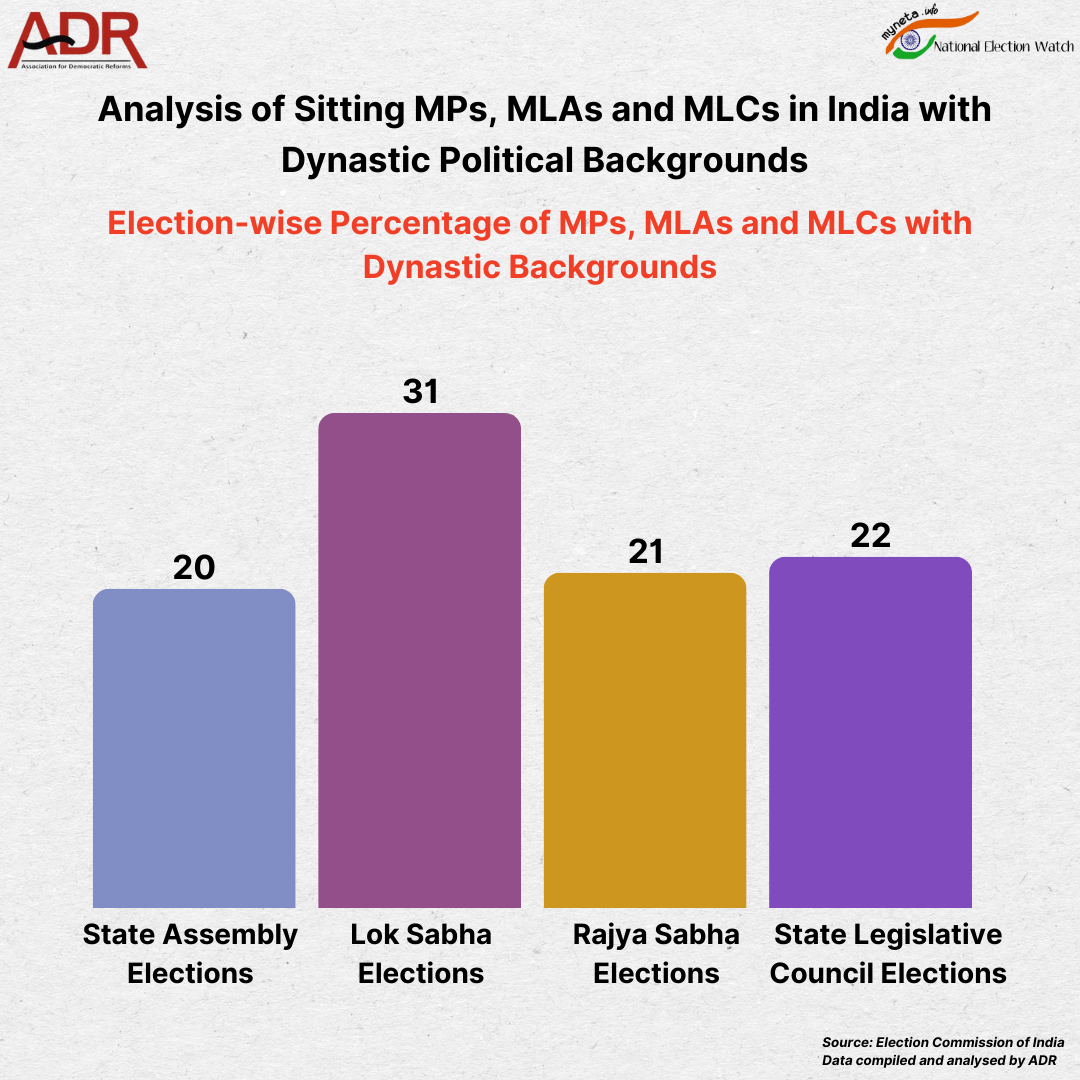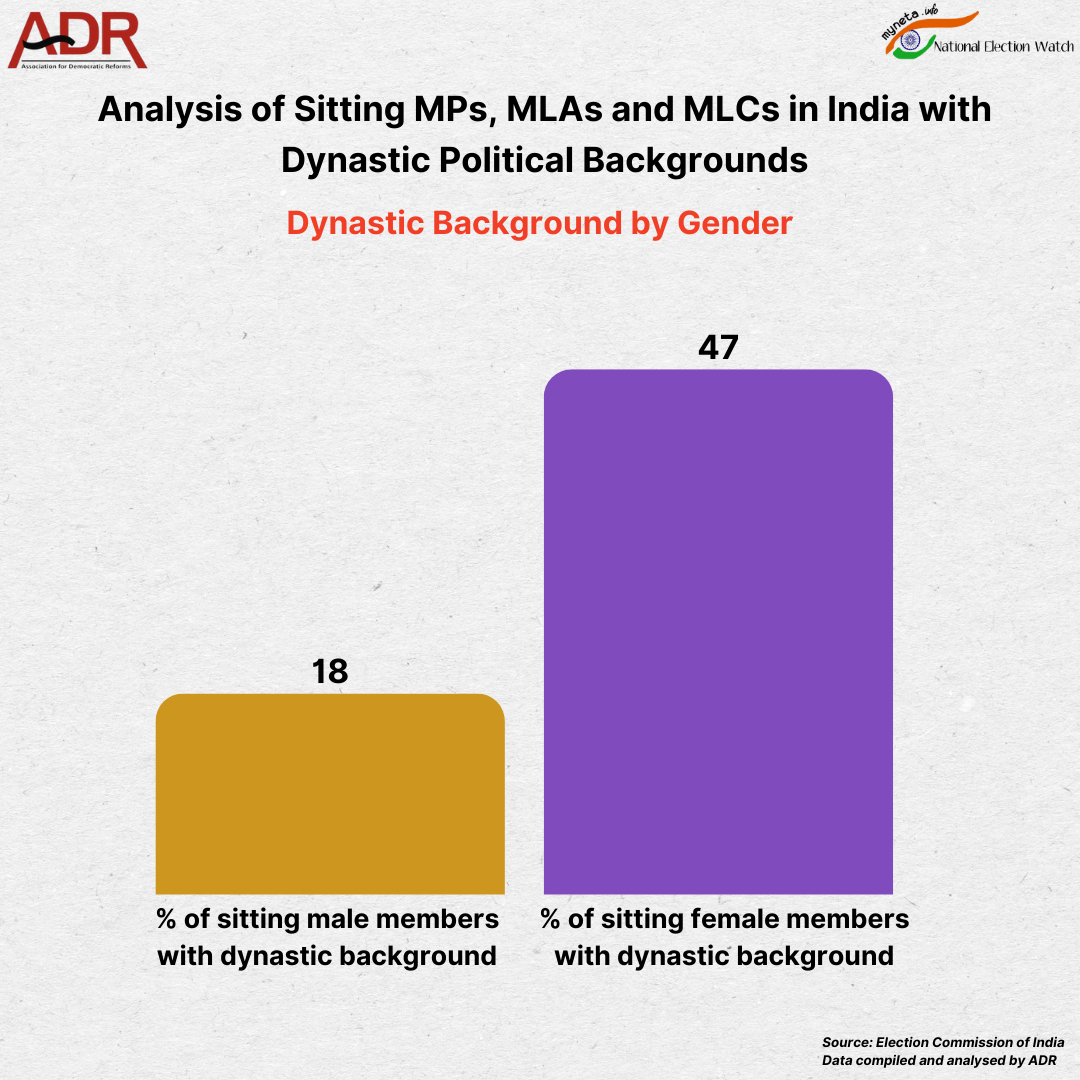



Copyright infringement not intended
Picture Courtesy: INDIAN EXPRESS
Indian Express study found that over 22% of about 5,300 legislators (Parliament, state Assemblies, and Councils) have family ties to previous or current legislators, sparking debate on its impact on democracy and meritocracy.
|
Read all about: DYNASTIC POLITICS IN INDIA: MEANING, CHALLENGES, WAY FORWARD |
What is Dynastic Politics?
Dynastic politics refers to the practice where political power, leadership positions, and electoral success are largely inherited across generations within a family.
 What are the Historical and Socio-Cultural Roots of Dynastic Politics?
What are the Historical and Socio-Cultural Roots of Dynastic Politics?
Feudal and Princely State Legacy
Before independence, power in princely states and zamindari systems was concentrated in specific families, establishing a hierarchical structure of inherited authority that carried over into democratic politics after 1947.
Charismatic Leadership and Post-Independence Consolidation
Early leaders of independent India, mainly from the Indian National Congress, gained popularity and personal loyalty, leading to their families becoming associated with the party and establishing a pattern of hereditary succession, with the Nehru-Gandhi family being the prime example.
Caste and Community Networks
Caste systems and strong community ties reinforce dynastic tendencies. Political families leverage existing caste and community loyalties to mobilize votes, transforming their family name into a recognized political brand.
Family as a Unit of Trust and Identity
Voters often favor candidates from established political families due to perceived continuity, stability, and reliability, with this "brand name" recognition promoting trust and reducing campaigning costs for dynasts.
Weak Internal Party Democracy
Many parties operate with highly centralized decision-making structures, where a "High Command" or a few top leaders control candidate selection and organizational posts.
The absence of regular, transparent internal elections or primaries allows leaders to handpick relatives as successors, encouraging loyalty over merit.
The Representation of the People Act (RPA) 1951, mandates registration for political parties but does not strictly enforce internal democratic functioning, giving the Election Commission of India (ECI) limited powers to intervene.
"Winnability" and Resource Access
Established political families bring instant name recognition, existing voter bases (built on caste or community lines), and financial resources for expensive election campaigns.
Dynastic candidates in the 2014 Lok Sabha elections had a 13% higher win probability and an 18-20% greater vote share compared to non-dynastic candidates, a clear advantage due to established networks and capital. (Source: Journal India Review)
Charisma, Legacy, and Voter Familiarity
Voters often favor candidates from political families due to established trust, familiarity, and a perceived sense of continuity and stability, leading to "persona politics" where family name influences voting decisions.
Caste and Community Networks
Political families use existing caste and community ties to garner votes, transforming what was once a social justice movement into an oligarchy where caste elites monopolize political representation within their families.
Regional parties exhibit strong dynastic tendencies, with some showing 30-40% dynasticism, and Andhra Pradesh having the highest share among larger states at 34%.
Feudal Mindset and Patronage
Historically, monarchical and feudal systems have normalized inherited power, leading to an acceptance of dynastic succession in modern politics, this promotes a system where loyalty to powerful political families outweighs individual merit or competence.
Lack of Alternatives and Political Entry Barriers
Dynastic politics hinders new talent and grassroots workers by prioritizing family connections, making it difficult for outsiders to secure tickets or leadership positions and solidifying existing dynastic structures.
Gender Inequality
The Association for Democratic Reforms (ADR) reports that 47% of female politicians have political family backgrounds, versus 18% of male politicians, suggesting family ties are a greater factor in women's political entry, strengthening patriarchy.
 What are the Impacts of Dynastic Politics?
What are the Impacts of Dynastic Politics?
Erosion of Meritocracy and Governance Quality
Prioritizing lineage over competence hinders new leaders and ideas, concentrating power within a few families and compromising governance quality. A 2018 Harvard study linked dynastic representation to increased poverty and fewer public services.
Reduced Accountability
Dynastic leaders may view positions as entitlements, leading to decreased accountability, lack of transparency, and unwillingness to take responsibility.
Limited Diversity and Innovation
Power concentration within a small number of families stifles diverse perspectives and political innovation, with policy-making often focused on family interests.
Increased Corruption and Cronyism
Dynastic systems are prone to nepotism and cronyism, filling key positions based on personal connections rather than qualifications, undermining good governance and leading to corruption.
Voter Disengagement
Limited choices due to powerful families can lead to voter apathy and fatigue, eroding trust in democratic institutions.
Undermining Democratic Principles
The concentration of political authority within a single family compromises fundamental democratic principles of equal opportunity and merit-based progression.
While there is no constitutional ban on dynastic politics, various recommendations and observations aim to strengthen internal party democracy and electoral fairness.
Election Commission of India (ECI) Guidelines
The Election Commission of India requires political parties to adhere to their internal constitutions and hold internal elections, but cannot deregister parties for undemocratic practices due to a lack of explicit legal authority.
Law Commission Reports
The Law Commission of India, in its 170th (1999) and 255th (2015) Reports on Electoral Reforms, emphasized the need for internal democracy and transparency within political parties.
Supreme Court Observations
The Supreme Court has upheld party autonomy while emphasizing the significance of democratic processes within political parties.
In the 2002 Indian National Congress (I) vs Institute of Social Welfare case, the SC held that the ECI cannot enforce internal democracy without explicit legal backing.
The Court in Sau. Sangeeta vs State Of Maharashtra (2021) emphasized that leadership changes within a political party must follow democratic procedures and party regulations.
Addressing the deep-seated issue of dynastic politics requires a multi-pronged approach encompassing legislative reforms, institutional strengthening, and increased public awareness.
Mandatory Internal Party Democracy
Parliament should amend the Representation of the People Act, 1951, to legally require transparent, periodic, and auditable internal party elections for all posts and candidate selection, to boost grassroots participation and curb arbitrary leadership power.
Empowering the Election Commission
Empower the ECI to enforce internal party democracy by auditing accounts, penalizing non-compliance, and deregistering consistently undemocratic parties, in line with the Law Commission's 255th Report.
Electoral Finance Reforms
Implement stricter campaign spending limits for candidates and parties, implement partial state funding of elections as per the Indrajit Gupta Committee Report (1998) to reduce reliance on private funds, and bring political parties under the RTI Act, 2005, for enhanced financial transparency.
Promoting Grassroots Leadership
Political parties should focus on promoting individuals based on merit rather than family connections, considering dynastic ties a disadvantage in ticket allocation.
Voter Awareness and Education
Voter education helps citizens to make informed decisions by focusing on candidates' merit and track record rather than traditional loyalties. An aware/educated electorate can better hold elected officials accountable.
Strengthening Anti-Defection Law
A stricter anti-defection law, with presidential or gubernatorial decisions based on Election Commission advice, would prevent easy party switching, strengthening unity and hindering dynastic manipulation of affiliations.
Conclusion
Addressing dynastic politics is essential to strengthen India's republican ideals and promote a political system that truly represents diverse population through internal democracy, fair opportunities, and merit.
Source: INDIAN EXPRESS
|
PRACTICE QUESTION Q. How does dynastic politics create a conflict between the democratic principle of equal opportunity and the ethical tenet of probity in governance? Explain with examples. 250 words |
Dynastic politics, a system where political power is inherited within families rather than solely earned on merit, is prevalent across many Indian political parties, both national and regional. A 2025 analysis by the Association for Democratic Reforms (ADR) revealed that approximately 21% of India's elected representatives at national and state levels originate from political families.
Dynastic politics is criticized for weakening democratic principles by hindering meritocracy, limiting opportunities for new talent, and reducing accountability. This often leads to a concentration of power and wealth among a small elite, worsening inequality. Studies also show that areas represented by dynasts tend to have poorer development and more clientelism.
Dynastic leaders offer stability, continuity, and political experience. Their name recognition aids voter mobilization and reduces campaign costs. In traditional societies, family connections can appeal to voters seeking stability, though this is also a point of contention.
© 2026 iasgyan. All right reserved